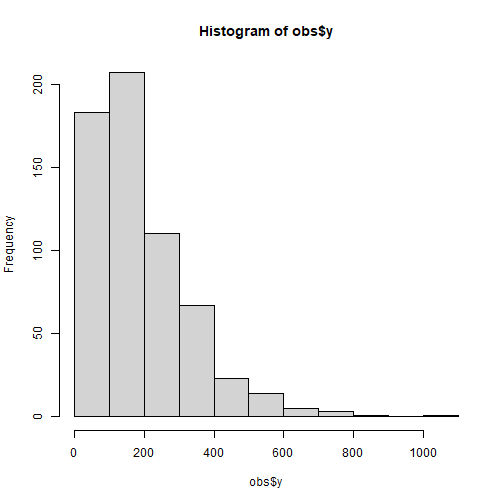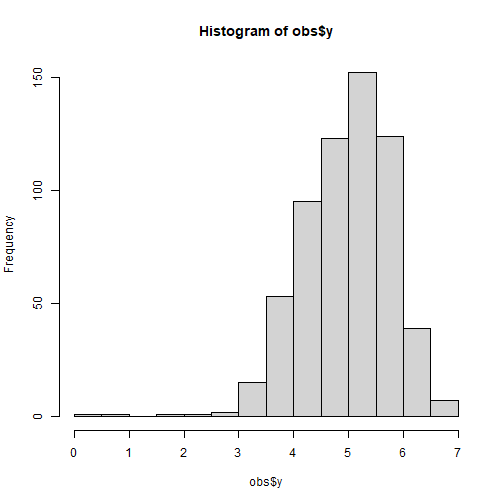Introduction to SecDim package
Load SecDim package
Here is an example of the spatial prediction using SDA models.
- Preparing data
# spatial data of response variables
data("obs")
# spatial data of optional SDA explanatory variables:
# b = 1, 3, 5, 7, and 9 km
# tau = seq(0, 1, 0.1)
# eight variables
data("sample_vars_sda")- Data pre-processing: logarithm transformation and removing outliers
obs$y <- obs$Cr_ppm
hist(obs$y)

krm <- rmvoutlier(obs$y)
## Remove 5 outlier(s)
y <- obs$y[-krm]
x <- lapply(sample_vars_sda, function(x) x[-krm,])- selecting the second dimension variables for SDA models
system.time({
sx <- selectvarsda(y, xlist = x)
})
## user system elapsed
## 0.94 0.11 2.19- SDA modeling
data.sda <- cbind(y, sx)
sda.lm <- lm(y ~ ., data.sda)
summary(sda.lm)
##
## Call:
## lm(formula = y ~ ., data = data.sda)
##
## Residuals:
## Min 1Q Median 3Q Max
## -1.92323 -0.47943 0.01662 0.39329 1.85379
##
## Coefficients:
## Estimate Std. Error t value Pr(>|t|)
## (Intercept) -8.963e+00 1.738e+00 -5.156 3.43e-07 ***
## v1X1 2.755e+00 7.064e-01 3.900 0.000107 ***
## v1X5 -3.105e-01 7.369e-01 -0.421 0.673627
## v1X7 -2.773e-02 5.164e-01 -0.054 0.957198
## v1X9 6.384e-02 5.040e-01 0.127 0.899253
## v2X1 -2.225e-01 4.544e-01 -0.490 0.624624
## v2X45 -8.250e-01 4.268e-01 -1.933 0.053701 .
## v3X2 -2.335e-02 4.614e-01 -0.051 0.959663
## v3X3 3.330e-01 4.369e-01 0.762 0.446328
## v5X14 4.826e-05 1.052e-03 0.046 0.963423
## v5X51 -2.067e-02 5.165e-03 -4.001 7.09e-05 ***
## ---
## Signif. codes: 0 '***' 0.001 '**' 0.01 '*' 0.05 '.' 0.1 ' ' 1
##
## Residual standard error: 0.623 on 598 degrees of freedom
## Multiple R-squared: 0.3397, Adjusted R-squared: 0.3286
## F-statistic: 30.76 on 10 and 598 DF, p-value: < 2.2e-16- comparing with FDA
data("sample_vars_fda")
data.fda <- data.frame(y, sample_vars_fda[-krm,])
fda.lm <- lm(y ~., data.fda)
summary(fda.lm)
##
## Call:
## lm(formula = y ~ ., data = data.fda)
##
## Residuals:
## Min 1Q Median 3Q Max
## -2.38773 -0.40570 0.03638 0.42603 2.17528
##
## Coefficients:
## Estimate Std. Error t value Pr(>|t|)
## (Intercept) -3.138e+00 1.008e+00 -3.112 0.00195 **
## Elevation 3.580e-03 6.150e-04 5.821 9.53e-09 ***
## Slope -1.701e-01 3.765e-02 -4.518 7.51e-06 ***
## Aspect 3.671e-05 3.210e-04 0.114 0.90899
## Water -2.398e-02 4.292e-03 -5.586 3.52e-08 ***
## NDVI -5.053e-01 7.049e-02 -7.168 2.24e-12 ***
## pH 8.872e-01 1.598e-01 5.552 4.25e-08 ***
## SOC 3.560e+00 5.103e-01 6.976 8.05e-12 ***
## Road -1.094e-02 3.594e-03 -3.043 0.00245 **
## ---
## Signif. codes: 0 '***' 0.001 '**' 0.01 '*' 0.05 '.' 0.1 ' ' 1
##
## Residual standard error: 0.634 on 600 degrees of freedom
## Multiple R-squared: 0.3139, Adjusted R-squared: 0.3047
## F-statistic: 34.31 on 8 and 600 DF, p-value: < 2.2e-16
Cross validation
R2 <- function(o, p) 1 - sum((o-p)^2)/sum((o-mean(o))^2)
## Example
# spatial data of response variables
data("obs")
# spatial data of optional SDA explanatory variables:
# b = 1, 3, 5, 7, and 9 km
# tau = seq(0, 1, 0.1)
# eight variables
data("sample_vars_sda")
# data pre-processing: logarithm transformation
obs$y <- obs$Cr_ppm
hist(obs$y)
obs$y <- log(obs$y)
hist(obs$y)
################################################
## SDA cross validation
################################################
# cross validation: 70% training and 30% testing
set.seed(100)
train <- sample(nrow(obs), 0.7*nrow(obs), replace = FALSE)
trainy <- obs[train,]
testy <- obs[-train,]
trainx <- lapply(sample_vars_sda, function(x) x[train,])
testx <- lapply(sample_vars_sda, function(x) x[-train,])
# removing outliers for training data
krm <- rmvoutlier(trainy$y)
trainy <- trainy$y[-krm]
trainx <- lapply(trainx, function(x) x[-krm,])
# generating explanatory variables for testing data
sdaxv <- sdapredvars(testx)
# selecting the second dimension variables for SDA models
system.time({
sx <- selectvarsda(y = trainy, xlist = trainx)
})
# SDA modeling and prediction
data.sda <- cbind("y" = trainy, sx)
sda.lm <- lm(y ~ ., data.sda)
sda.lm.pred <- predict(sda.lm, newdata = sdaxv)
R2(testy$y, sda.lm.pred)
plot(testy$y, sda.lm.pred, xlim = c(3, 7), ylim = c(3, 7))
################################################
## FDA cross validation
################################################
data("sample_vars_fda")
# cross validation: 70% training and 30% testing
set.seed(100)
train <- sample(nrow(obs), 0.7*nrow(obs), replace = FALSE)
trainy <- obs[train,]
testy <- obs[-train,]
trainx <- sample_vars_fda[train,]
testx <- sample_vars_fda[-train,]
# removing outliers for training data
krm <- rmvoutlier(trainy$y)
trainy <- trainy$y[-krm]
trainx <- trainx[-krm,]
# FDA modeling and prediction
data.fda <- data.frame("y" = trainy, trainx)
fda.lm <- lm(y ~ ., data.fda)
fda.lm.pred <- predict(fda.lm, newdata = data.frame(testx))
R2(testy$y, fda.lm.pred)
plot(testy$y, fda.lm.pred, xlim = c(3, 7), ylim = c(3, 7))
Figure 1. Comparison of cross
validation between SDA and FDA models for spatial predictions.